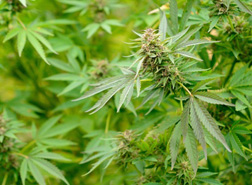|
|
Dry Mouth and Your Teeth
|
|---|
|
Dry
Mouth and Your Teeth
If I was a dentist, I might
seriously consider moving my practice to Colorado, or perhaps
Washington. Can you guess why?
If
your guess had to do with those states' shift in marijuana laws, you
would be correct. Not, however, due to any new medical
discoveries whereby marijuana plays a role in dental treatment -- just
the opposite, in fact.
What I am getting at is one of the effects marijuana has on the user, which would be Xerostomia. Xerostomia is what the infamous 'cotton mouth' is more commonly referred to among the profession.  Is it a big deal? Maybe not to the
user--at first--but to the
dentist, I suppose it might be fairly lucrative due to the damage that
Xerostomia can cause to the teeth and gums over the long term. Is it a big deal? Maybe not to the
user--at first--but to the
dentist, I suppose it might be fairly lucrative due to the damage that
Xerostomia can cause to the teeth and gums over the long term.One might say, "C'mon! It's no big deal, just a small annoyance..." as one sucks on a sugar-laden soda to quench the thirst. Certainly good for the dentist! Here's the big deal: Your natural saliva is 99.5% water. The other .5% includes enzymes which have a variety of duties. A pretty important bodily function is digestion, and digestion begins in the mouth. Some of these enzymes break down larger food molecules into smaller ones so that they are easier to deal with as they continue through the digestive process, including the conversion of starches into sugars. Other enzymes actually have antimicrobial properties, protecting the teeth and gums from pathogens living off the foods trapped in the crevices of the teeth, between the teeth underneath the gum line. Some will actually do their jobs further on, assisting throughout the digestive track.  Of
course, saliva moistens the food we eat so it can be swallowed but it
also plays a major role in correcting the pH of the oral environment in
order to counter the acidity due to certain foods and pathogenic
activity. This watery fluid also carries ionic trace minerals
necessary for re-building tooth enamel, lost to an acidic environment.
Most of us desire to keep our tooth enamel hard, I assume. Of
course, saliva moistens the food we eat so it can be swallowed but it
also plays a major role in correcting the pH of the oral environment in
order to counter the acidity due to certain foods and pathogenic
activity. This watery fluid also carries ionic trace minerals
necessary for re-building tooth enamel, lost to an acidic environment.
Most of us desire to keep our tooth enamel hard, I assume.As you can see, your saliva plays a pretty important role in the day-to-day function of the body as a whole, and simply re-moisturizing with water may be helpful to some degree, but not quite the total remedy to dry mouth. Now before we a  ll start wagging our fingers at the
marijuana smokers and the
notorious methamphetamine users, xerostomia is a side effect of MANY prescription
medications, cancer treatments, including chemotherapy and radiation,
as well as certain diseases such as Sjögren's syndrome or
diabetes. When I was studying what Dr. Robert Nara had written on
the subject a few decades ago, there were a just a handful of
'dry-mouth inducing' prescription and over-the-counter medications as
well as Marijuana and Amphetamines. Now there are over 400 known
pharmaceuticals whose side effects include Xerostomia.
For the most part we are looking at antidepressants, antihistaminics,
narcotics and certain antihypertensives. ll start wagging our fingers at the
marijuana smokers and the
notorious methamphetamine users, xerostomia is a side effect of MANY prescription
medications, cancer treatments, including chemotherapy and radiation,
as well as certain diseases such as Sjögren's syndrome or
diabetes. When I was studying what Dr. Robert Nara had written on
the subject a few decades ago, there were a just a handful of
'dry-mouth inducing' prescription and over-the-counter medications as
well as Marijuana and Amphetamines. Now there are over 400 known
pharmaceuticals whose side effects include Xerostomia.
For the most part we are looking at antidepressants, antihistaminics,
narcotics and certain antihypertensives.Saving your teeth and gums from an out-of-control decay process would be my intention in focusing on this information. Of course, the best way to counter dry mouth is to remove the cause, where possible. Where that isn't possible, certainly keeping the mouth moist with water is very helpful and using an OTC product such as Biotene Oral Rinse As for myself, it is public speaking which instantly creates a desert oral environment, and thoughts of those huge deli dill pickles or sauerkraut won't even do the trick. If I take a sip of water for relief, it seems to evaporate before it even hits the back of my throat. Since everything has a purpose, that may be nature's way of telling me to shut up. Tom |